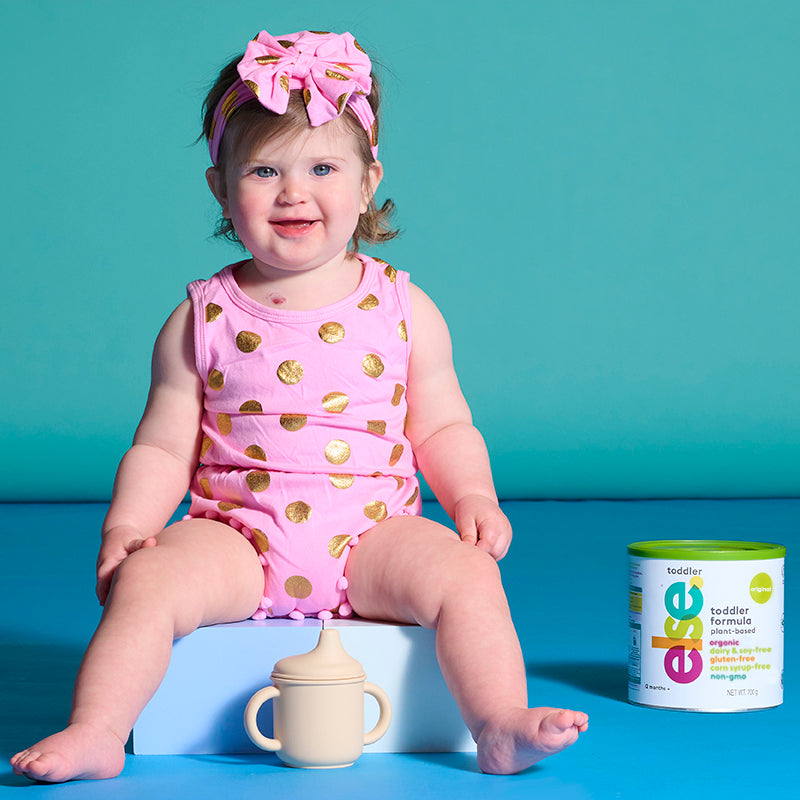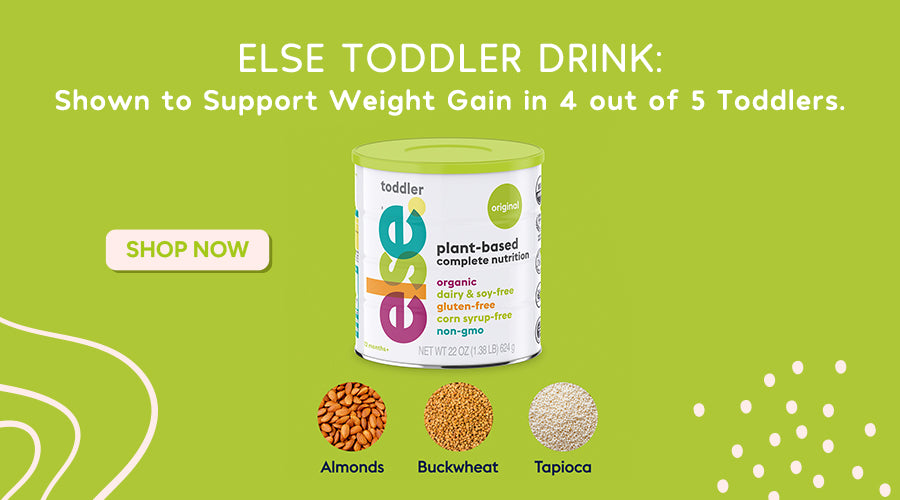
Is toddler formula a must-have in your little one’s diet? Cut through the confusion with this straightforward guide. We’ll explore what sets toddler formula apart, compare it to alternatives like cow’s milk, and offer sound advice for informed parenting decisions. Get the essentials on ingredients and usage, without excess jargon, in our in-depth look at toddler nutrition.

Key Takeaways
- Toddler formulas are supplemental to a child’s diet and vary greatly due to the lack of FDA-regulated nutritional guidelines, making label examination crucial.
- Plant-based options like Else Toddler Omega offer an alternative for those seeking dairy-free, fortified nutrients.
- Best toddler formula choices cater to individual needs with special considerations for allergies and dietary restrictions, and consultation with a pediatrician is key before incorporating them into a child’s diet.
Understanding Toddler Formulas: A Nutritional Perspective
Toddler formulas are specifically designed for children aged 1-3, serving as a supplement or transition from breast milk to solid foods. Unlike infant formulas, which are often the sole source of nutrition, toddler formulas are intended to complement a child’s diet once solid foods are introduced. They’re like the trusty sidekick to the superhero that is a balanced diet, providing nutritional support when needed.
The vast array of toddler formula options on the market can make the selection process overwhelming for caregivers. But don’t worry! With the right information and understanding, picking the best toddler formulas for your child can be as easy as ABC.
Examining Ingredients in Toddler Formulas
Moving on, we’ll take a look at the key factor: the ingredients. Many toddler formulas may contain high levels of sugar, such as corn syrup, and are typically more expensive than cow’s milk, potentially lacking added nutritional benefits.
While toddler formulas often include necessary added nutrients such as iron and vitamins D and A, some also contain artificial sweeteners - not exactly what you want for your little one, right? Carefully examining labels is necessary to know exactly what your child is consuming.
It was Time for Something 'Else': Our Plant-Based Complete Toddler Formulas
Next, we turn our attention to our groundbreaking products in toddler nutrition - Else Toddler Omega and Else Toddler Organic. It’s like the new kid on the block that everyone wants to know about. Else Toddler Omega is a plant-based, complete & balanced nutrition drink for toddlers, containing all macronutrients and over 20 essential vitamins and minerals. It also contains omega 3 and omega 6 fatty acids to support brain development in your little one. It’s like a powerhouse of nutrients all packed into a convenient drink. Else Toddler Organic uses USDA certified organic ingredients.
Designed to supplement the diet of toddlers ages 1-3 years, Else Toddler formulas can be used daily or occasionally. They fit perfectly into a dietary plan that includes any combination of breast milk, cow milk, toddler milks, or solid foods. So, whether you’re looking for a daily nutrition supplement or an occasional treat, Else Toddler products have got you covered.
Our Plant-Based Complete Nutrition Drinks for toddlers are crafted with real, whole-food ingredients and use minimal processing to leave in maximum nutrition. They're also Clean Label Project certified, giving you real peace of mind from heavy metals or pesticides. They're low in sugar, and contain over 20 essential vitamins and minerals for help support your toddler's growth and development.

Comparing Toddler Formula to Whole Cow Milk
Toddler formulas may contain less protein compared to cow’s milk, which is hypothesized to reduce the risk of obesity in later life potentially. Balancing the pros and cons based on your child’s specific needs is key in choosing between toddler formulas and cow milk.
Plant-Based Alternatives to Cow Milk
For parents looking for a plant-based alternative to cow’s milk, fortified plant milk, such as soy milk, can be a suitable alternative. Think of it as a way to diversify your child’s diet while still meeting their nutritional needs. This can be especially valuable for toddlers with cow’s milk allergies. It’s like finding a safe haven in a storm.
However, keep in mind that not all plant-based milks are equally nutritious. Ensuring that plant-based alternatives are packed with essential nutrients, either naturally or supplemented, is essential. That’s where Else Toddler comes in. It’s dairy-free and contains no lactose, providing an alternative for those avoiding both lactose and dairy. Plus, the protein in Else Toddler Omega comes from buckwheat and almonds, providing a diverse fat profile derived from almond butter, coconut oil, and rapeseed oil. It’s like getting all the good stuff without the potential allergens.

Selecting the Best Toddler Formulas
Choosing the best toddler formula should be as personalized as picking out the perfect outfit, matching your child’s specific needs and preferences. High-quality toddler formulas often include essential vitamins, minerals, and specific nutrients like prebiotics and DHA, catering to children with special dietary needs. It’s like a tailored suit, specifically designed for your child’s nutrition.
Additionally, organic toddler formulas are favorably received by parents concerned about potential exposure to:
- pesticides
- GMOs
- hormones
- synthetic ingredients
Formulas with A2 beta-casein protein offer a digestible option for toddlers with milk sensitivity. It’s like having a menu of options to choose from, ensuring you pick the one that’s just right for your child. Or you can choose a dairy-free option that's something Else :)
Toddler formulas vary in milk base, offering options such as A1 cow’s milk, goat milk, or toddler milk designed to closely mimic breast milk, supporting different preferences and weaning processes.
Reading Labels for Toddler Formula Nutrition
Deciphering the nutrition labels of toddler formulas requires a keen eye for detail to fully comprehend the nutritional composition. Toddler formulas are often co-branded with infant formulas, using sequential names or similar logos, which can lead to confusion about their completeness as nutritional sources. But fear not, we’re here to help you decipher the code.
The nutritional content of toddler formulas can differ significantly, necessitating careful examination of labels to understand which nutrients are included and meet infant guideline standards. Look for essential vitamins and minerals on the label, such as vitamins D, B, C, E, A, and minerals like phosphorus, iron, and magnesium. These are important for toddler growth and development, ensuring they receive all the nutrients needed.
Understanding Toddler Formula Regulations
Understanding the regulations of toddler formulas can be quite complex. Here are some key points to keep in mind:
- Toddler formulas in the United States are not regulated by the FDA, leading to a lack of uniform standards in their nutritional content.
- Unlike infant formulas, which undergo FDA review and approval, including annual inspections of production facilities, toddler formulas do not have such stringent regulations.
- It’s like a wild west out there.
The absence of FDA regulations for toddler formulas results in variations in nutrient profiles, with some containing added sugars and other nonessential ingredients.
Integrating Toddler Formula into Your Child's Diet
If you’re considering introducing toddler formula into your child’s diet, it should be a gradual process rather than an abrupt shift. To transition a child to toddler formula, follow these steps:
- Mix a small amount of toddler formula with their current milk or formula.
- Gradually increase the amount of toddler formula over time, while decreasing the amount of their current milk or formula.
- Monitor your child’s reaction and adjust the transition speed accordingly.
- It’s important to consult with your child’s pediatrician before making any changes to their diet.
This process can be likened to introducing a new character in your child’s favorite story - it’s done gradually, allowing them time to adjust.
Start with a 1:3 ratio of toddler formula to current milk or formula and gradually increase the proportion over time. This approach can help ease the transition and adapt the child’s palate and digestive system to new ingredients. It’s like taking a gentle stroll rather than a sprint - it’s all about taking it one step at a time.
Recipes and Serving Suggestions
Incorporating toddler formula into your child’s diet can be an enjoyable and creative task rather than a mundane chore. Toddler formula can be used in nutrient-packed smoothies and hot cocoa mixtures, providing an easy way to boost the nutritional content of a toddler’s beverage intake. It’s like giving your healthy toddlers a super-charged drink that tastes delicious and is good for them.
You can also make homemade popsicles infused with toddler formula for a nutritious and fun snack. Or why not try mixing toddler formula into oatmeal or using it to create homemade energy bites? These can enhance the nutritional profile of a toddler’s solid food options, providing a healthful twist on everyday meals. It’s like having a secret weapon in your parenting arsenal.
When to Consult Your Child's Doctor
In matters of your child’s health and nutrition, a pediatrician is an invaluable resource. Parents should always consult with their pediatrician before deciding to use toddler formula to ensure it aligns with their child’s specific health needs. It’s like having a trusted advisor guiding you through the decision-making process.
Pediatricians should assess a child’s nutritional intake when cow’s milk is avoided and may recommend toddler formula for children with allergies, lactose intolerance, or inadequate growth.
Choosing the appropriate formula is crucial for children at risk of allergies, and pediatric guidance should be sought to select a suitable formula whether a child is breastfed or formula-fed. It’s like having a personalized road map for your child’s nutritional journey.
The Role of Toddler Formula in Child Development
Toddler formulas, beyond being a source of nutrition, can significantly influence your child’s development. Infant formulas fortified with milk fat globule membrane (MFGM) components can improve a toddler’s cognitive functions, showing enhancements in intelligence and executive functions. It’s like providing the building blocks for your child’s mental development.
Feeding infants with formula containing MFGM and lactoferrin for a year has led to a notable increase in IQ, particularly impacting processing speed and visual-spatial abilities. Plus, toddler formulas containing prebiotics and probiotics contribute to the development of a robust immune system in young children. So, the right toddler formula is not just about feeding your child, it’s about nourishing their potential.
Shopping for Toddler Formula: Tips and Tricks
Purchasing toddler formula isn’t as simple as a regular trip to the grocery store. It requires careful consideration of factors such as budget, nutritional needs, and convenience. Toddler formula can be purchased in grocery stores, pharmacies, and online marketplaces. So, you have plenty of options to choose from.
Look out for discounts, bulk purchases, and subscription options when buying toddler formulas to save money. But remember, it’s not just about the price tag. It’s also crucial to verify the expiry date of toddler formula before purchasing, especially when buying in bulk. And don’t forget to store it in a cool, dry place and seal it properly to extend its shelf life and prevent contamination. So, happy shopping!
Summary
Navigating the world of toddler formulas can feel overwhelming, but it becomes a manageable and enjoyable task with the right information. From understanding what toddler formulas are and how they’re used, to examining their ingredients, comparing them to cow’s milk, and exploring plant-based alternatives, we’ve covered a lot of ground.
In conclusion, it’s all about making informed choices based on your child’s specific needs, consulting with your pediatrician, and understanding the role of toddler formula in child development. Remember, the best toddler formula for your child is the one that meets their nutritional needs while complementing a balanced diet.
Here’s to healthy and happy toddlers!
Frequently Asked Questions
What is the difference between formula and toddler formula?
The main difference between formula and toddler formula is that toddler formulas are unregulated and not nutritionally complete. Pediatricians recommend breastfeeding or using infant formula until 12 months.
Is 2 years old too old for formula?
Yes, by the time a child is a year old, they can get enough nutrients from solid food and cow's milk and don't need formula anymore. A Plant-Based complete nutrition drink like our Else toddler formulas, can be a suitable option until 36 months, especially for those will sensitivities to dairy or soy.
What is the purpose of toddler formulas?
The purpose of toddler formulas is to provide nutritional support for children aged 1-3 as a supplement or transition from breast milk to solid foods. They are intended to complement a child's diet once solid foods are introduced.
Are there any potential issues with the ingredients in toddler formulas?
Yes, some toddler formulas may contain high levels of sugar and artificial sweeteners, and no consistent FDA-regulated nutritional guidelines exist for them. Be cautious and read the labels carefully when choosing a toddler formula.
The content and advice provided in this article is for informational purposes only and is not a substitute for medical diagnosis, treatment, advice for specific medical conditions. Always consult a pediatrician to understand the individual needs of your child. The article expresses the views of the article editor.




